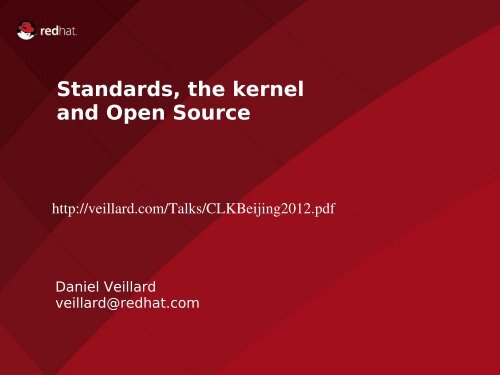Standards, the kernel and Open Source - Daniel Veillard
Standards, the kernel and Open Source - Daniel Veillard
Standards, the kernel and Open Source - Daniel Veillard
You also want an ePaper? Increase the reach of your titles
YUMPU automatically turns print PDFs into web optimized ePapers that Google loves.
<strong>St<strong>and</strong>ards</strong>, <strong>the</strong> <strong>kernel</strong><br />
<strong>and</strong> <strong>Open</strong> <strong>Source</strong><br />
http://veillard.com/Talks/CLKBeijing2012.pdf<br />
<strong>Daniel</strong> <strong>Veillard</strong><br />
veillard@redhat.com
<strong>St<strong>and</strong>ards</strong>: why ?<br />
Main purpose is interoperability<br />
● Public description of <strong>the</strong> technology<br />
● Test suite or conformance checks<br />
Main benefit is cheaper, ubiquitous technology<br />
● Not tied to one vendor<br />
● Larger user base<br />
● Competition between vendors
Classic example: camera/phone cable
<strong>St<strong>and</strong>ards</strong>: How ?<br />
Various st<strong>and</strong>ard bodies, process is usually:<br />
1)Multiple actors<br />
2)Agreement to make a public specification<br />
3)Shared work on creating that specification<br />
4)Multiple initial versions (with feedback)<br />
5)Vote <strong>and</strong> publication as a st<strong>and</strong>ard<br />
6)Maintainance<br />
Usually takes a few year, often painful
St<strong>and</strong>ardization groups<br />
And many o<strong>the</strong>rs ...
What about <strong>the</strong> Linux <strong>kernel</strong> ?<br />
Linux is in <strong>the</strong> C language, which is st<strong>and</strong>ardized !<br />
<br />
<br />
<br />
Linux initial success was tied to <strong>the</strong> POSIX API<br />
●<br />
Implementing <strong>the</strong> st<strong>and</strong>ard gained a lot of applications<br />
We rely on st<strong>and</strong>ardized hardware<br />
●<br />
●<br />
●<br />
Buses (PCI/I2C...)<br />
Protocols to talk to disks <strong>and</strong> o<strong>the</strong>r peripherals<br />
Boot process<br />
We rely on st<strong>and</strong>ardized networking<br />
●<br />
From <strong>the</strong> lowest level: frame/packet level<br />
● Up to <strong>the</strong> application: Web, Video, etc ...
Looking more closely<br />
Looking at <strong>the</strong> linux <strong>kernel</strong> code 3.6.1 source code<br />
<br />
<br />
<br />
IETF RFC st<strong>and</strong>ards:<br />
● Reference 212 different RFCs in <strong>the</strong> code base (544,<br />
791, 792, 793, .... up to 5961, 6106, 6164, 6298)<br />
Many many references to IEEE<br />
●<br />
●<br />
●<br />
802.11/802.15.4 for all <strong>the</strong> wireless<br />
1394/1212/1284 for firewire/SCSI/parallel<br />
754 floating point arithmetic<br />
ISO st<strong>and</strong>ards:<br />
●<br />
...<br />
CD filesystems, character sets, networking
Why should I care ?<br />
<br />
<br />
<br />
Sometimes you won't have <strong>the</strong> choice:<br />
●<br />
●<br />
Interoperability is crucial<br />
New hardware is coming<br />
Sometimes you have <strong>the</strong> choice:<br />
●<br />
●<br />
●<br />
Which st<strong>and</strong>ard(s) to implement<br />
Finding relevant st<strong>and</strong>ards can be challenging<br />
You may not like it, make sure you don't exclude it by<br />
design<br />
Sometimes you want to be involved:<br />
● It may still be time to fix it !<br />
●<br />
●<br />
They may need your implementation to finish<br />
Providing test case <strong>and</strong> suites helps interop
St<strong>and</strong>ard <strong>and</strong> Software in parallel<br />
<br />
<br />
<br />
Parallel developments<br />
●<br />
●<br />
Same deadline<br />
Reference code<br />
Good points:<br />
●<br />
●<br />
●<br />
Feedback<br />
Timing is good<br />
Positive perception<br />
Bad point:<br />
●<br />
●<br />
St<strong>and</strong>ard<br />
Software<br />
What if <strong>the</strong> st<strong>and</strong>ard doesn't pass<br />
Frequent changes to <strong>the</strong> code as <strong>the</strong> draft evolves<br />
That situation is not very common
Late implementor<br />
<br />
<br />
<br />
React upon dem<strong>and</strong><br />
●<br />
●<br />
Existing need<br />
Spec looks okay<br />
St<strong>and</strong>ard<br />
Good points:<br />
●<br />
●<br />
●<br />
Spec is stable<br />
Existing User base<br />
Minimal effort<br />
Benefit from earlier implementor efforts<br />
Bad points:<br />
Too late to change <strong>the</strong> specification<br />
●<br />
Competing with existing implementations<br />
That situation is very common, usually <strong>the</strong> easiest<br />
Software
Early implementor<br />
<br />
<br />
<br />
St<strong>and</strong>ardize existing code base(s)<br />
●<br />
●<br />
Software works<br />
St<strong>and</strong>ard<br />
Build a st<strong>and</strong>ard Software<br />
Good points:<br />
●<br />
Clear direction<br />
Existing User base<br />
Bad points:<br />
Existing user base<br />
●<br />
●<br />
The specification will change, your code too<br />
Competing with o<strong>the</strong>r people on <strong>the</strong> st<strong>and</strong>ard choices<br />
That happens, this can be hell
<strong>Open</strong> <strong>Source</strong> specific<br />
Our code is public, are <strong>the</strong> st<strong>and</strong>ards (or drafts) too ?<br />
Do we have <strong>the</strong> resources to implement <strong>the</strong> spec fully ?<br />
<br />
<br />
Collaboration with <strong>the</strong> Working Group can be great:<br />
●<br />
Feedback loop integrate <strong>the</strong> <strong>Open</strong> <strong>Source</strong> Process<br />
● Who pays for <strong>the</strong> membership fees ?<br />
●<br />
Can be very time consuming<br />
One very hard issue : Patents<br />
●<br />
●<br />
Affects us harder than proprietary code<br />
Different st<strong>and</strong>ard bodies approaches<br />
● Royalties free (W3C)<br />
● RAND (Reasonable non discriminatory)<br />
●<br />
Workarounds are not always possible
Conclusions<br />
<br />
A lot of st<strong>and</strong>ards impact <strong>Open</strong> <strong>Source</strong> projects<br />
●<br />
●<br />
●<br />
Don't ignore <strong>the</strong>m, be ready<br />
Sometimes it is worth contributing<br />
Be careful in your implementation<br />
● Interop is important<br />
● Avoid legal issues<br />
<br />
Some st<strong>and</strong>ard body are friendly to OSS<br />
●<br />
●<br />
Free 'expert' access<br />
Legal provisions to avoid patent issues<br />
http://veillard.com/Talks/CLKBeijing2012.pdf


